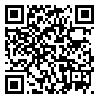Volume 24, Issue 1 (2018)
AIJH 2018, 24(1): 103-121 |
Back to browse issues page
Download citation:
BibTeX | RIS | EndNote | Medlars | ProCite | Reference Manager | RefWorks
Send citation to:



BibTeX | RIS | EndNote | Medlars | ProCite | Reference Manager | RefWorks
Send citation to:
zibayi M. The reflection of George Salem’s impressibility of Kafka’s existentialistic thoughts in the novel “In exile”. AIJH 2018; 24 (1) :103-121
URL: http://aijh.modares.ac.ir/article-31-13691-en.html
URL: http://aijh.modares.ac.ir/article-31-13691-en.html
Islamic Azad University , Monireh.zibayi@yahoo.com
Abstract: (7326 Views)
Kafka's novels are one of the Western novels that contemporary Arabic literature through it became familiar with the philosophy of existentialism and its principles. George Salem, a Syrian writer who was influenced by existentialism, read Kafka’s novels and was influenced in the novel “In exile” from his thoughts. This article follows and reveals the thoughts in the novel “In exile”.
Using an adaptive method, the present research studies Salem’s novel “in exile” and compares it with Kafka’s Palace and Trial and aims to reveal Salem’s impressibility from Kafka’s works and existential thoughts.
Based on result, George Salem believes that human without any optional thrown into existence So that he finds himself in a certain situation. Influenced by Kafka’s works which instill existentialist concepts, the Syrian writer focuses in the first part of his novel on Kafka's novel “Palace” by relying on falling to the ground theme and in the second part relating to one’s dominance on an individual he focuses on Kafka's novel “Trial”. George survives Kafka reflects the existential topics in the novel ‘In exile’, Concepts such as original Sin, Guilt and human alienation.
Using an adaptive method, the present research studies Salem’s novel “in exile” and compares it with Kafka’s Palace and Trial and aims to reveal Salem’s impressibility from Kafka’s works and existential thoughts.
Based on result, George Salem believes that human without any optional thrown into existence So that he finds himself in a certain situation. Influenced by Kafka’s works which instill existentialist concepts, the Syrian writer focuses in the first part of his novel on Kafka's novel “Palace” by relying on falling to the ground theme and in the second part relating to one’s dominance on an individual he focuses on Kafka's novel “Trial”. George survives Kafka reflects the existential topics in the novel ‘In exile’, Concepts such as original Sin, Guilt and human alienation.
Article Type: مقالات علمی پژوهشی |
Subject:
Arts and Humanities (General)
Received: 2016/03/13 | Accepted: 2017/04/24 | Published: 2017/09/22
Received: 2016/03/13 | Accepted: 2017/04/24 | Published: 2017/09/22
Send email to the article author
| Rights and permissions | |
 |
This work is licensed under a Creative Commons Attribution-NonCommercial 4.0 International License. |







